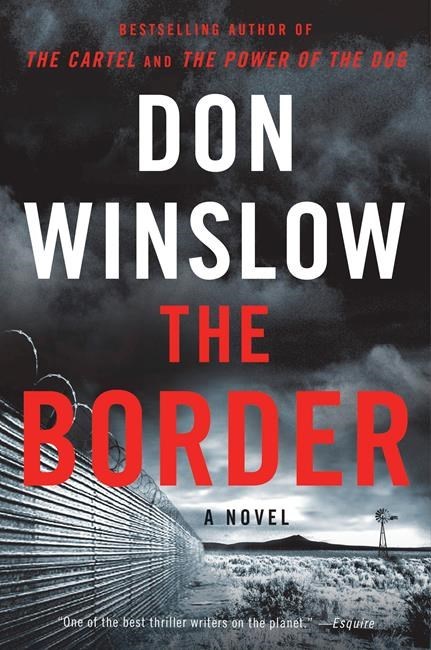
This cover image released by William Morrow shows "The Border," a novel by Don Winslow. (William Morrow via AP)
January 29, 2019 - 6:22 AM
"The Border" (William Morrow), by Don Winslow
Don Winslow's epic trilogy about America's longest war, which he launched with "The Power of the Dog" in 2005 and continued with "The Cartel" in 2015, comes to a powerful and troubling conclusion in his new novel, "The Border."
By "longest war," Winslow does not mean Afghanistan. He means the war on drugs, which is 50 years old and counting.
Although Winslow chose to tell this story as fiction, he spent much of the last 20 years researching his subject on both sides of the border. "The more I learned," he says his introduction, "the angrier I became."
Art Keller, a violent Drug Enforcement Agency undercover operative in the first two novels, returns as the unlikely choice to run the Drug Enforcement Administration. He was reluctant to take the job, but he's come to recognize that his previous efforts have come to naught.
"You're standing on the Rio Grande with a broom ... trying to sweep back the tide of heroin while billionaires are sending jobs overseas, closing factories and towns, killing hopes and dreams, and inflicting pain. Then they tell you to stop the heroin epidemic."
Opiates, he knows, "are a response to pain. ... The difference between a hedge fund manager and a cartel boss? The Wharton Business School."
So Keller attacks the problem in a new way, seeking to uncover and punish powerful Americans who profit from the drug trade. He zeros in on an American bank that's laundering tens of millions of dollars for the cartels by investing in New York City real estate. Those benefiting from the dirty money, it turns out, include the newly elected president of the United States, whom Winslow coyly names Dennison, and unambiguously models after Donald Trump.
Other characters from the first two books return, and more are added in a novel with a half-dozen subplots ranging from Mexican cartel power struggles to Guatemalan child asylum seekers to New York City junkies scrounging for a fix. The novel, written in muscular, fast-paced prose, portrays torture, assassinations, mass murder, police payoffs, mass incarceration and political corruption from Guatemala to Washington, D.C.
In the end, the words Winslow puts in his protagonist's mouth leave no doubt what his years of research have led him to believe:
"Because drugs are illegal, we send sixty billion dollars a year to the violent sociopaths of the cartels, money that bribes police and politicians and buys the guns that have killed hundreds of thousands of people with no end in sight. The 'Mexican drug' problem is not a Mexican drug problem. It is the American drug problem. We are the buyers, and without buyers, there can be no sellers."
___
Bruce DeSilva, winner of the Mystery Writers of America's Edgar Award, is the author of the Mulligan crime novels including "The Dread Line."
___
Online:
http://don-winslow.com/
http://www.brucedesilva.com/
News from © The Associated Press, 2019